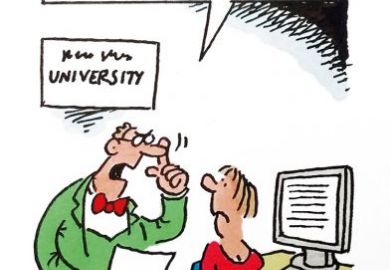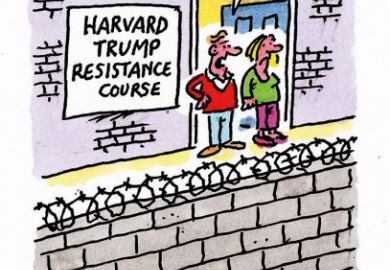
“What do we want? Evidence-based policy! When do we want it? After peer review!” This was the chant that echoed around the streets of London as thousands of researchers joined the March for Science on 22 April. The event was one of 600 held worldwide – also including places as far afield as Greenland and Antarctica – in protest against the way that research appears to be maligned and underfunded by the administration of US President Donald Trump and by other governments worldwide. Satire was in abundant supply for placards on show at events around the globe, with slogans including “Think while it is still legal”, “Got the plague? Me neither. Thanks Science!”, “Society should worry when geeks have to demonstrate” and (for a UK audience) “Experts in this country have had enough of people like Michael Gove”.
The political earthquake delivered by the first round of France’s presidential election, which saw the centrist Emmanuel Macron and the National Front leader Marine Le Pen advance to next month’s run-off, is already being felt in the country’s higher education sector. Mr Macron is likely to attract significant support from the academy, where Ms Le Pen’s anti-immigrant rhetoric is likely to fall flat – however, much of this backing might be quite grudging. Mr Macron has pledged to continue the shift towards greater institutional autonomy pursued by both the centre-right former president Nicolas Sarkozy and by the socialist incumbent François Hollande, but some fear that this thinly disguises a bid to reinvent French universities on the marketised Anglo-Saxon model. In a Times Higher Education blog, Matthew Reisz highlighted how one left-wing polemic on the subject was written in French but revealingly switched to English for the words “New Public Management” and “bullshit”.
With a theme park already devoted to Dolly Parton’s life, creating a university course in her honour might seem like small fry to the country music superstar. The US singer-songwriter, however, seemed thrilled by the news that University of Tennessee, Knoxville is teaching a history module titled “Dolly’s America”, The New York Times reported on 20 April. “From the girl voted in High School ‘least likely to succeed’ this sure is a blessing,” tweeted Ms Parton, who grew up in poverty in a Smoky Mountains log cabin before hitting the big time in Knoxville. Reading materials for the Dolly Parton course will include the icon’s 1994 autobiography, My Life and Other Unfinished Business, but students will also be asked to consider Dixie history through the lens of “a poor white girl born in mid-century Appalachia”, said course leader Lynn Sacco. “It’s really kind of a nerdy class,” added Dr Sacco, who will no doubt be reminding students of the importance of working “nine to five”.
A research project on the sex lives of prairie voles has gained an unlikely supporter – the adult video site Pornhub, The Washington Post reported on 12 April. The $25,000 (£19,521) scholarship provided by the website to University of Michigan doctoral student Natalie Nevarez has allowed the neurobiologist to investigate how the brain chemistry of voles affects whether they are monogamous or not, the newspaper explained. Pornhub said that the grant was part of its efforts to support women in science, with Ms Nevarez being the standout candidate for the scholarship on account of her compelling backstory: she would regularly rise at 4am to help prepare lunch for her fruit picker parents, both of whom had left school by the age of 13. Ms Nevarez said she believed that her racy PhD subject might have had some role in attracting the website’s interest: “I thought that whoever read about a scholarship from Pornhub would also probably find it interesting to read about studying monogamy.”
A philosopher is claiming to have finally solved one of history’s most-discussed conundrums – would you kill an infant Adolf Hitler if you had a time machine? The answer – according to Christof Mandry, from Goethe University Frankfurt – is a resounding “no”, reported The Sun on 20 April. Although many have argued since 1945 that the murder of the future Führer while still an innocent baby would be a moral act given the destruction that he caused, Professor Mandry said that the killing could never be justified. “It is a seductive thought – you avoid the Second World War, the Holocaust and all evils of the 20th century if you simply kill Adolf Hitler as a toddler!” he said. “To place all responsibility on Hitler [would] hide the fact that so many supported him so enthusiastically,” he continued, adding that it is “misleading to say [that the Holocaust] was solely and exclusively attributable to Hitler.”
Register to continue
Why register?
- Registration is free and only takes a moment
- Once registered, you can read 3 articles a month
- Sign up for our newsletter
Subscribe
Or subscribe for unlimited access to:
- Unlimited access to news, views, insights & reviews
- Digital editions
- Digital access to THE’s university and college rankings analysis
Already registered or a current subscriber?


